About our Department
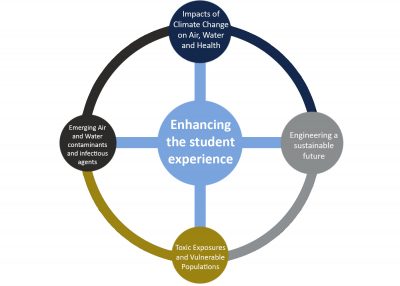 Who we are
Who we are
The Department of Environmental Sciences and Engineering at the UNC Gillings School of Global Public Health is the first of its kind based in a school of public health. This position gives us a unique focus on the interface between people and the environment. We offer interdisciplinary programs – in air quality and atmospheric processes, human exposure and health effects, safe and sustainable water resources, climate change and One Health – that draw on faculty expertise in the physical and life sciences, engineering, economics and policy.
Our work to respond to, plan for and mitigate new and evolving environmental threats within the broader context of a One Health approach creates solutions that build on the department’s 100-year tradition of local and global impact. Through innovative research, education and training, ESE faculty and students will continue to discover and implement solutions for air and water quality and public health protection.
With the distinction of being the nation’s top public school of public health, the Gillings School has a special responsibility to prepare the world’s next public health leaders. Our students follow in the footsteps of influential alumni from decades past. To remain a leader and continue to push boundaries, we must support our students by offering both innovative educational opportunities and the financial resources to pursue them. Our ESE students are creative problem solvers, uniquely prepared to design and implement effective environmental health solutions.
Our Focus
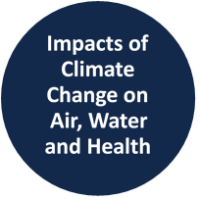 Climate change will drive future challenges. As we approach ESE’s centennial, we celebrate tremendous environmental achievements and recognize the urgent need to mitigate and respond to the pressing challenges posed by global change. WHO lists climate change as the #1 threat to global health in 2019. Climate change brings droughts, floods, heatwaves and extreme weather events, which in turn impact air pollution, water availability and quality, toxic releases, food and nutrition, infectious and non-communicable diseases, and will increase migration and conflict pressure and exacerbate health inequities. We work to understand the effects of climate change on health and to develop policy options for climate change mitigation and adaptation with co-benefits for health.
Climate change will drive future challenges. As we approach ESE’s centennial, we celebrate tremendous environmental achievements and recognize the urgent need to mitigate and respond to the pressing challenges posed by global change. WHO lists climate change as the #1 threat to global health in 2019. Climate change brings droughts, floods, heatwaves and extreme weather events, which in turn impact air pollution, water availability and quality, toxic releases, food and nutrition, infectious and non-communicable diseases, and will increase migration and conflict pressure and exacerbate health inequities. We work to understand the effects of climate change on health and to develop policy options for climate change mitigation and adaptation with co-benefits for health.
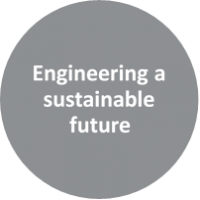 Our work today builds on ESE’s long tradition of local and global impact. We are the nation’s first engineering department in a school of public health and we enrolled our first Sanitary Engineering master’s student, Roy Jay Morton, under Thorndike Saville in the fall of 1920, when there was a pronounced need to improve water safety in the towns and cities of North Carolina. Our focus on engineering has not wavered in the last 100 years as we seek to design solutions for environmental and public health protection using a variety of computational, experimental, and field approaches. Our research and substantive policy guidance move us closer to a sustainable future.
Our work today builds on ESE’s long tradition of local and global impact. We are the nation’s first engineering department in a school of public health and we enrolled our first Sanitary Engineering master’s student, Roy Jay Morton, under Thorndike Saville in the fall of 1920, when there was a pronounced need to improve water safety in the towns and cities of North Carolina. Our focus on engineering has not wavered in the last 100 years as we seek to design solutions for environmental and public health protection using a variety of computational, experimental, and field approaches. Our research and substantive policy guidance move us closer to a sustainable future.
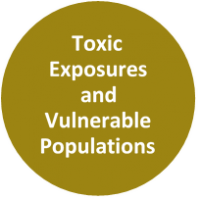 Our faculty study the range of processes that ultimately lead to environmentally-related diseases, from characterizing and quantifying human exposure to understanding the cellular, molecular and biochemical underpinnings of these diseases. Environmentally-driven disease is influenced by various complex factors including exposure to environmental toxicants and pollutants in both air and water, individual differences in genetic and epigenetic susceptibility, and nutrition.
Our faculty study the range of processes that ultimately lead to environmentally-related diseases, from characterizing and quantifying human exposure to understanding the cellular, molecular and biochemical underpinnings of these diseases. Environmentally-driven disease is influenced by various complex factors including exposure to environmental toxicants and pollutants in both air and water, individual differences in genetic and epigenetic susceptibility, and nutrition.
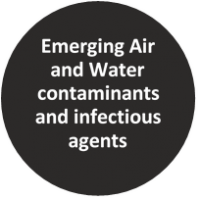 Threats to environmental and human health are continuously evolving. Thus, the study of emerging contaminants (e.g., PFAS) and infectious agents (e.g., COVID-19), play a major role in the health and safety of future populations. Major departmental research activities include: developing methods to measure and monitor chemical or microbial contaminants; ascertaining the linkages between sources and exposures; developing/using models to design effective exposure reduction strategies; and elucidating the genetic factors that lead to differences in disease outcomes among individuals or populations.
Threats to environmental and human health are continuously evolving. Thus, the study of emerging contaminants (e.g., PFAS) and infectious agents (e.g., COVID-19), play a major role in the health and safety of future populations. Major departmental research activities include: developing methods to measure and monitor chemical or microbial contaminants; ascertaining the linkages between sources and exposures; developing/using models to design effective exposure reduction strategies; and elucidating the genetic factors that lead to differences in disease outcomes among individuals or populations.
How you can help
 At this pivotal time, we call on ESE alumni and friends to recognize and celebrate our Centennial Celebration by partnering with our school and department to move environmental solutions forward. Funding opportunities listed below are a snapshot of ways in which an investment will impact our students for the next 100 years.
At this pivotal time, we call on ESE alumni and friends to recognize and celebrate our Centennial Celebration by partnering with our school and department to move environmental solutions forward. Funding opportunities listed below are a snapshot of ways in which an investment will impact our students for the next 100 years.
The Centennial Scholarship Fund
Supported through pooled funding from alumni and friends, The Centennial Scholarship is designed to support one student annually whose research project pushes the boundaries of research in air, water, or environmental health, as determined by a faculty committee nominated by the department chair. The scholarship offers financial assistance for tuition, travel, practicum experiences, living expenses, or other pressing needs to support the student’s research and course work. Overtime, we hope The Centennial Scholarship will grow to cover full cost of tuition and expenses, making it one of the premier awards offered by the Gillings School.
Individual named master’s and doctoral scholarship and fellowship endowments
Ranging from $5,000 to $50,000 in annual assistance for one or more graduate students to cover such costs as research, national or global travel, projects, practicum experiences, dissertation, stipends and other key needs. Endowed scholarship and fellowship opportunities from a $100,000 – $1,250,000 investment allow the department to pursue highly competitive students who are actively recruited by peer institutions. Preferences on qualifying criteria are available.
FIRE Grants
A $5,000 award supports undergraduate students during the summer, preparing them for a lab setting and future research in master’s and doctoral programs. By partnering with the Chancellor Scholars Program, these FIRE Grants create a pipeline for science careers and encourage first- and second-year minority students to pursue science, technology, engineering and mathematics and environmental science fields.
EQUIP Labs
With a goal to promote undergraduate involvement in team and community-engaged research, EQUIP labs make ESE more visible to prospective UNC undergraduates and help us to recruit top undergraduate students into ESE’s BSPH program. $10,000 underwrites the needs of five students during an academic year.
For our Present and Future
Our graduates take with them an integrated, interdisciplinary, quantitative and experiential education that links environmental threats to impacts and enables the development of creative and effective solutions. They engage in efforts to improve environmental quality locally and globally – through technological innovation, effective environmental policies, research, and community engagement. Our faculty are internationally recognized for their work in air pollution, environmental health sciences, climate change and health, global water policy, infectious disease and microbiology, exposure science, environmental chemistry, transport and engineering.
By partnering with us, you can help Gillings School continue to deliver results for a sustainable and healthy future. To learn more about how your philanthropy can impact Environmental Sciences and Engineering students, please email Matt Cain, Senior Director of Development, at mattcain@unc.edu.
